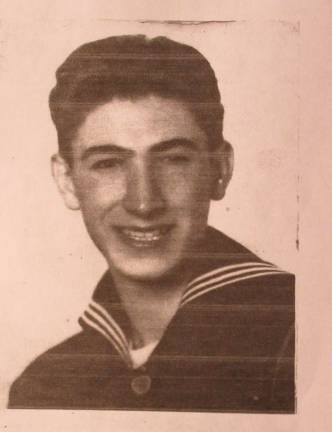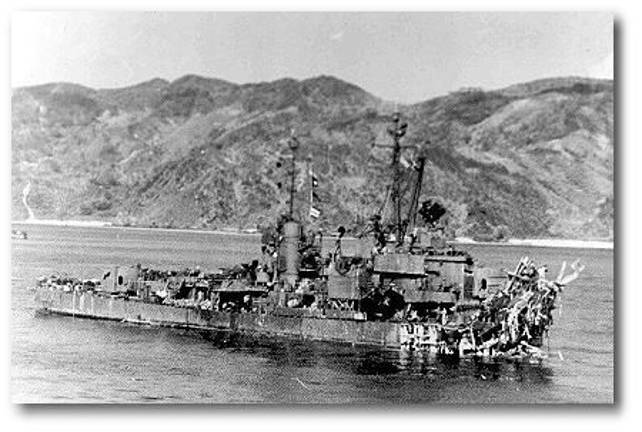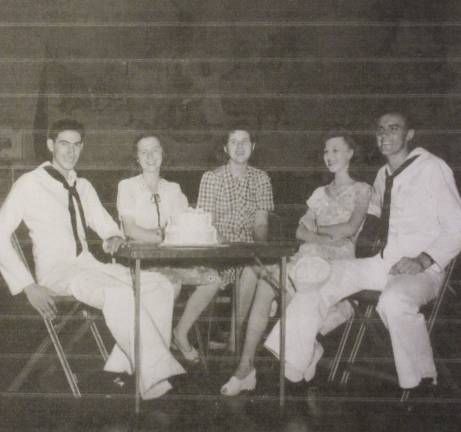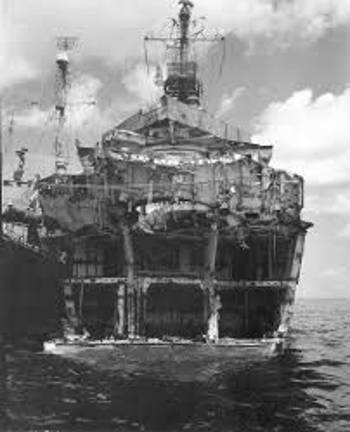Chester LeBaron and the ship that wouldn't sink




By Ginny Privitar
GOSHEN — Goshen resident Chester LeBaron was on the USS Lindsey for almost four years, working first as a water tender 2nd class and later as a fireman 1st class. His job was to run the boilers.
The ship was a DM-32, a destroyer minelayer that operated in the Pacific Theater. She provided close-in covering fire as minesweepers cleared the harbor at Iowa Jima and knocked out six enemy guns.
Then one day, LeBaron recalled, "We were escorting the sweeping boats. We were with them to protect them. One was blown up by mines and we recovered about 15 sailors and about half of them were dead. We buried them at sea."
The Lindsey arrived at Okinawa on March 25, 1945, where she covered minesweeping operations and planted radar buoys to mark cleared channels for the troop transports. She engaged in shore bombardment and radar patrol.
'They were all gone'On April 12, she came under a mass kamikaze attack. Her gunners kept the enemy under fire, reducing one plane almost to wreckage. It crashed and exploded on the deck.
Flames killed five gun crew members and wounded others. The forward fire room was engulfed in flames.
Less than a minute later another enemy plane, on fire from the Lindsey's guns, hit the port bow. According to a history of the Lindsey, "The bomb it was carrying exploded, sending shrapnel into the ship's forward magazine, which in turn exploded, ripping a gaping hole of sixty feet off the ship's bow."
LeBaron recalled the day.
"I ran out to see what happened and I didn't have a life jacket with me," he said. "I actually saw the pilot. I came up to the handling room and saw the plane had killed everybody on deck. I went up to bridge to get a life jacket. Every day I passed a cage with life jackets. I pulled the pin but they didn't come out."
Then the vests poured out.
"They knocked me down," said LeBaron. "By the time I stood up, they were all gone."
Other sailors grabbed the vests. Most of the crew thought the ship would sink.
"The bow was all gone, but the bulkheads were still there," LeBaron said.
LeBaron went below to see if bilges were leaking, but there were no cracks. Safety valves on the boilers went off, pouring out 600 pounds of steam. The noise was tremendous. The fire room was quickly abandoned.
LeBaron was worried enemy that combatants from a nearby Japanese ship might board, and so he figured he'd better get a gun. A rifle marksman, he knew where gun cabinet was. When he got there, though, he found a motor from the first plane, smoking.
"I couldn't get past that," LeBaron recalled.
There was gasoline everywhere, and fire too.
"We had mine tracks on our ship which were opened up from the plane going over," he said. "I thought 'This doesn't look good.' I saw some real brave sailors actually throwing them over the side, and none of them went off."
Then he discovered a friend unconscious at a gun mount.
"The thing swung around, bent the barrel of the gun and he was whipped around," he said.
His friend survived, but every bone in his body was broken, LeBaron said. He recalled him in casts, from neck to foot, after medics from other ships took care of him.
Some men got blown over the side. Only a few were found. The ship had dipped from the impact, filling the lower handling room with water. That whole crew drowned and was recovered a week later.
AftermathAfter the attack, the Aaron Ward (DM-34) came alongside to render assistance and provide protection with its guns. The Champion (a.m.-314) provided medical assistance. The tug Tawakoni (ATF) arrived to bring the Lindsey the 20-plus miles to Kerama Retto, where repairs were made. Fifty seven crew members were killed or lost, and fifty seven more wounded. The USS Lindsey in August 1945 made her way home to the Norfolk Naval Shipyard, where she underwent more repairs and was later decommissioned on May 25, 1946.
"I didn't believe they would do it," LeBaron said, describing his feelings after the carnage. "I was out of it because so many of my friends were killed."
Seeing the kamikaze attacks, he thought, "We're going to have trouble with the war, if they're going to do that."
He stayed with the ship and helped prepare it for decommissioning. But he was depressed.
"I was on a ship that wasn't working, and there was nothing I could do," he said.
Editor's note: This story has been updated from the original to correct an error.